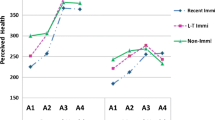Abstract
This study examined the association between individuals’ proportion of life spent in the United States and the health status and health behaviors among Korean immigrants aged 25 and above. The analysis is stratified by level of education to test whether a higher proportion of time spent in the United States is associated with poorer health among both less educated and highly educated Korean immigrants. California health interview survey data from 2005 to 2007 were used to estimate logistic regression models of health and health behaviour among Korean immigrants, stratified by educational attainment. The health and health behaviour of less educated Korean immigrants tended to be worse among those with a higher proportion of residence in the United States. However, more highly educated Korean immigrants tended to exhibit lower odds of being unhealthy and lower odds of poor health behavior with a higher proportion of life spent in the United States. Acculturation is not always associated with poorer immigrant health outcomes. A higher proportion of life spent in the United States tends to be associated with more favorable health and health behavior among highly educated Korean immigrants.
Similar content being viewed by others
References
U.S. Bureau of the Census. Current population reports. Washington: U.S. Government Printing Office; 2000.
Terrazas A. Korean Immigrants in the United States. Migration Policy Institute; 2009.
U.S. Bureau of the Census. Current population reports. Washington: U.S. Government Printing Office; 2010.
Cho J, Juon HS. Assessing overweight and obesity risk among Korean Americans in California using World Health Organization body mass index criteria for Asians. Prev Chronic Dis. 2006;3:A79.
Jang Y, Kim G, Chiriboga D, Kallimanis B. A bidimensional model of acculturation for Korean American older adults. J Aging Stud. 2007;21:267–75.
Lee S, Nguyen HA, Tsui J. Interview language: a proxy measure for acculturation among Asian Americans in a population-based survey. J Immigr Minor Health. 2011;13:244–52.
Roh S, Jang Y, Chiriboga DA, Kwag KH, Cho S, Bernstein K. Perceived neighborhood environment affecting physical and mental health: a study with Korean American older adults in New York City. J Immigr Minor Helath. 2011;13(6):1005–12.
Song YJ, Hofstetter CR, Hovell MF, Paik HY, Park HR, Lee J, Irvin V. Acculturation and health risk behaviours among Californians of Korean descent. Prev Med. 2004;39:147–56.
Sohn L, Harada ND. Knowledge and use of preventive health practices among Korean women in Los Angeles County. Prev Med. 2005;41:167–78.
Hurh WM. The Korean Americans. Westport: Greenwood; 1998.
Hurh WM, Kim KG. Korean immigrants in America: a structural analysis of ethnic confinement and adhesive adaptation. Cranbury: Fairleigh Dickinson University Press; 1984.
Kim YS, Naughton F. Koreans in the United States: economic achievement and assimilation. Korean J Popul Dev. 1993;22:181–95.
Lopez-Garza M, Diaz DR. Asian and Latino immigrants in a restructuring economy: the methmorphosis of Southern California. Stanford, CA: Stanford University Press; 2001.
Sam DL, Berry JW, editors. Cambridge handbook of acculturation psychology. Cambridge: Cambridge University Press; 2006.
Gans H. Introduction. In Sandberg N, editor. Ethnic identity and assimilation. The Polish community. New York: Praeger; 1973.
Sandberg N, editor. Ethnic identity and assimilation. The Polish community. New York: Praeger; 1973.
Zhou M. Segmented assimilation: issues, controversies and recent research on the new second generation. Int Migr Rev. 1997; 31(4):975–1008.
Portes A, Zhou M. The new second generation: segmented assimilation and its variants among post-1965 immigrant youth’. Ann Am Acad Political Soc Sci. 1993;530:74–98.
Portes A, Rumbaut RG. Legacies: the story of the immigrant second generation. Berkeley: University of California Press and Russell Sage Foundation; 2001.
Rumbaut RG. Social assimilation of immigrants. In NJ. Smelser, PB. Baltes, editors. International encyclopedia of the social and behavioral sciences. Oxford: Pergamon; 2001. p. 845–49.
Rumbaut RG, John RW. Infant health among indochinese refugees: patterns of infant mortality, birthweight, and prenatal care in comparative perspective. Res Sociol Health Care. 1989;8:137–96.
Ronald W, Binkin N, Clingman EJ. Pregnancy outcomes among Spanish-surname women in California. Am J Public Health. 1986;76:387–91.
Landale NS, Oropesa RS, Llanes D, Gorman BK. Does Americanization have adverse effects on health? stress, health habits, and infant health outcomes among Puerto Ricans. Soc Forces. 1999;78(2):244–85.
California Health Interview Survey. CHIS Survey Methodology and Sample Design; 2007. [on-line] Available at http://www.chis.ucla.edu/methods_main.html.
California Health Interview Survey. Survey Methodology; 2008. [on-line]. Available at http://www.chis.ucla.edu/methods.html.
Bratter JL, Eschbach K. Race/ethnic differences in nonspecific psychological distress: evidence from the National Health Interview Survey; 2005.
Abraido-Lanza AF, Armbrister AN, Florez KR, Aguirre AN. Toward a theory-Driven model of acculturation in public health research. Am J Public Health. 2006;96:8.
Lee S, Nguyen HA, Tsui J. Interview language: a proxy measure for acculturation among Asian Americans in a population-based survey. J Immigr Minor Health. 2011;13:244–52.
Semple K. Moving to U.S. and Amassing a Fortune, No English Needed. New York Times. 8 Nov, 2011. [on-line]. Available at http://www.nytimes.com/2011/11/09/nyregion/immigrant-entrepreneurs-succeed-without-english.html?pagewanted=all.
Author information
Authors and Affiliations
Corresponding author
Rights and permissions
About this article
Cite this article
Ra, C.K., Cho, Y. & Hummer, R.A. Is Acculturation Always Adverse to Korean Immigrant Health in the United States?. J Immigrant Minority Health 15, 510–516 (2013). https://doi.org/10.1007/s10903-012-9723-2
Published:
Issue Date:
DOI: https://doi.org/10.1007/s10903-012-9723-2



